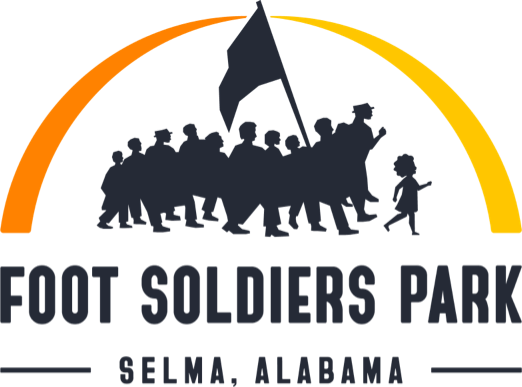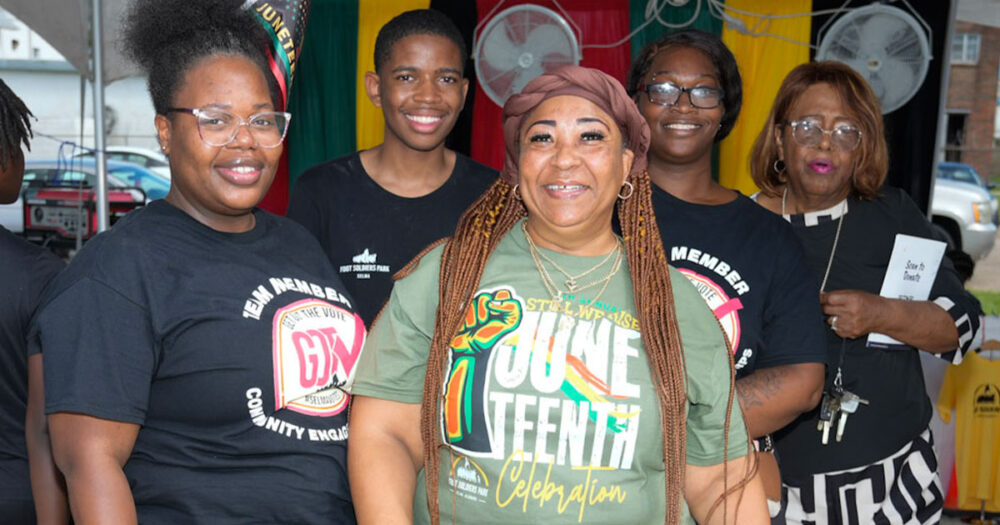
From Survival to Service
Frances Cleveland, 50 has been Foot Soldiers Park’s Civic Engagement Manager for the organization’s Community Engagement Corps (CEC) for almost a year. Her journey from single mother to factory worker to Program Manager for Foot Soldiers Park’s Community Engagement Corps (CEC), the organizing arm of the organization, embodies its transformative vision: that lasting change comes not from outside experts, but from trusted community members who understand Selma’s struggles and possibilities.
Born and raised in Selma, Frances absorbed her community’s history not in textbooks but through family conversations. Her mother and aunt were foot soldiers fighting for voting rights during the Civil Rights Movement. Yet for years, Frances was too busy surviving—working since age 15, becoming a teenage mother at 14, earning her GED while raising her daughter.
“I lost out on a lot of things because I worked all the time,” recalled Frances. “I had to take care of my daughter, and I didn’t want to have to depend on anybody else.”
She worked restaurant jobs, call center jobs, drove forklifts, and supervised manufacturing teams for Hyundai. She was embedded in Selma, but disconnected from its civic legacy.
This changed when she was invited to join the Community Engagement Corps (CEC). The CEC is the civic engagement program which is part of the organization’s Civil Rights in Action impact area. The CEC members are trained to lead voter outreach, civic education and community-based organizing in Selma.
Frances wasn’t looking for a career change at the time. But when she started working with the community something clicked. Here was work rooted in her own community’s history—work that honored the sacrifice of those who came before and invited people to exercise their civic duty today.
Building Leaders from Within
Frances’s leadership skills were noticed and she moved from CEC captain overseeing one of CEC’s canvassing teams to program manager overseeing the entire program in less than a year. She is an example of Foot Soldiers Park’s core philosophy: invest in people who already belong. As a captain engaging directly with community members, Frances excelled. She understood how to train and organize people, build trust and lead to get things done. When others weren’t able to deliver, Frances stepped up to lead all four CEC teams—twenty-nine members strong.
Being promoted to Civic Engagement Manager meant she needed to gain new skills and learn how to be even more effective. One area she knew she needed to improve was her computer skills and digital literacy. She was also worried that she didn’t know everything about civic engagement or civil rights history, and speaking in front of “important people” terrified her. But reflecting back on her lived experiences she realized something crucial: leadership isn’t about having all the answers. It’s about caring enough to keep learning and showing up.
Her moments of doubt could have ended her Foot Soldiers Park journey, but CEO Kimberly Smitherman saw her commitment and potential for growth and decided to invest in her–covering the costs of computer literacy courses and mentoring her. Staff members also believed in her when she didn’t always believe in herself, reminding her that support was always available. Today, she has earned two certificates in computer skills and trauma facilitation that she applies on a daily basis in her work. All of this support can be best seen through the results of her efforts—increased voter turnout among her target audiences by 20%.
“Frances is the embodiment of showing up—even in uncertainty—with a caring heart and a genuine willingness to learn, grow, and lead,” said Kimberly.
Cycles of Empowerment in Action
Frances’s story is where Foot Soldiers Park’s vision crystallizes. Frances doesn’t just register voters. She does it as someone who lives in Selma and can relate to people’s disillusionment with civic structures and engagement. She channels her experience and knowledge into action. When a skeptical South Side High School student insisted voting wouldn’t matter, Frances didn’t lecture. She connected him to a larger truth about his place in Selma’s history. As a young Black man from Selma, the odds were strong that his family had lived through the discrimination and disenfranchisement the foot soldiers fought against. Even if he didn’t know all of the details, his existence in this moment—with the right to vote—was built on their struggle. Voting meant honoring their legacy. The result? The young man registered along with seven other first time voters who joined the conversation.
“Our people lost their lives to get us the right to vote. That alone should be enough for you to do something,” Frances says. She told the young student, “I don’t even know anything about your [extended family], but I hurt for them, knowing that they lost their lives so we can have rights, to make our voice be heard, to get out and make some changes, no matter how long it takes.”
Frances is inspired to be a part of Foot Soldiers Park vision—to build a new generation of CEC members, trusted peers in the community who can advance change while developing the confidence, skills, and civic connection to sustain it.
She now stands before Selma residents not as an external agent of change, but as proof that community members, regardless of age, can become Selma’s leaders—preserving their community’s legacy and investing in its future.
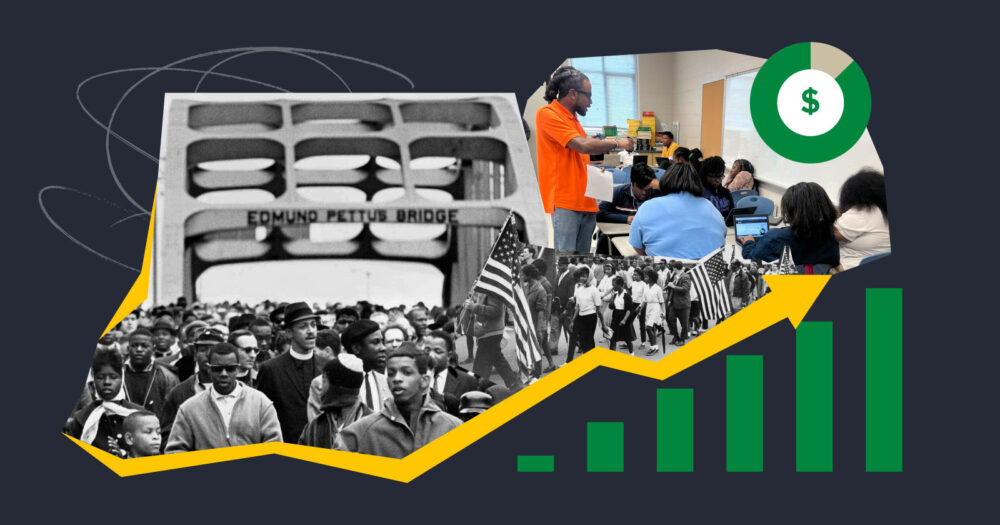
In the Crossroads of Civil Rights and Economic Justice
Selma, Alabama—the birthplace of the Voting Rights Act—has taught America a vital truth: civil rights without economic power perpetuates oppression. Sixty years after Bloody Sunday, the brave foot soldiers who crossed the Edmund Pettus Bridge won the right to vote for everyone in America, but economic justice has remained out of reach for most Black residents in Selma. Today, Foot Soldiers Park is leading a transformational movement at the intersection of two critical areas for democracy: building wealth and breaking generational cycles of poverty, and civic education as a means to civil rights in action. These focus areas recognize what the foot soldiers of 1965 knew well—true liberation requires both political and economic power.
The Harsh Reality: Selma’s Economic Crisis Since 1965
Despite winning voting rights, Selma’s Black community continues to face devastating economic challenges that echo the deprivation of the Jim Crow era. The statistics paint a sobering picture: over 80% of Selma’s population is Black and 41% of residents live under the poverty line. The median household income in Selma is below the state average at just $32,184 but for Black residents this number is even lower at the astonishing $27,755. In 1965, according to a Civil Rights Commission report, only 130 of 15,115 eligible Black residents in Dallas County were registered to vote—less than 1%.
However, while voting rights were won, economic opportunity was not. By 2015, fifty years after Bloody Sunday, unemployment for young Black residents in Selma exceeded 20%, and many families still lived in the same government-subsidized housing they occupied in 1965. The closure of Craig Air Force Base in 1977, which had provided $35 million in payroll, triggered an economic collapse from which Selma has never recovered. Manufacturing jobs disappeared, Black-owned businesses shuttered, and white flight accelerated, leaving behind the city’s Black community trapped in generational poverty.
The wealth gap tells an even starker story. In Dallas County, where Selma is located, 43% of residents have subprime credit scores below 660, severely limiting access to homeownership and capital. The Black homeownership rate nationally is just 44%—30 percentage points below White homeownership (74%). In the Black Belt region where Selma sits, median home values are 35% lower than the rest of Alabama, automatically putting residents at a long-term disadvantage to accumulate wealth and build stable homes. For every dollar earned by White households in Alabama, Black households earn just 58 cents.
Building Generational Wealth Through the Power of Civic Engagement
Foot Soldiers Park’s Building Wealth programs address this crisis head-on through financial literacy workshops, entrepreneurship training, homeownership preparation, access to resources and workforce development. Our newly launched BUILD UP pilot at Selma High School is designed to equip students with budgeting skills, career planning, and business fundamentals—creating strong foundations and sustainable pathways out of poverty. These programs recognize that economic barriers perpetuate racial injustice and that wealth-building and economic mobility is essential to full citizenship.
Simultaneously, through the programs of our Civil Rights in Action impact area we work to preserve Selma’s sacred history by educating and empowering the next generation civic leaders and residents to continue the fight. Through our Footsteps and Build Up programs, young people can learn first hand that activism is not just part of history—it’s their inheritance, inspiration and responsibility. These immersive programs ensure that Selma’s legacy informs contemporary movements for justice, teaching that the fight for freedom is not an end point, but an act of sacrifice and bold efforts.
In Selma, the struggles for civic duty, civil rights, and economic justice are inseparable. The right to vote and to be heard in public life directly shapes whether communities gain the investments and protections needed to prosper and gain economic vitality. When Black residents are underrepresented in government and decision-making spaces, policies often ignore or even reinforce the realities of low wages, food insecurity, limited homeownership, and barriers to business ownership that define daily life for many families. Civic engagement programs like our Community Engagement Corps, Footprints, and voter education efforts help people understand how school funding, housing policy, access to capital, and workforce programs are all outcomes of what and whom they vote for.
At the same time, wealth-building initiatives that expand financial literacy, support Black entrepreneurship, close skills gaps, and connect residents to homeownership and employment opportunities give people the material stability and confidence to participate fully in democracy and advocate for their interests. Breaking the cycle of poverty in places like Selma requires community engagement, participation and sustainable investment in both the civics and economic fabric of the town: without political power, economic gains are fragile and easily reversed, and without economic security, residents are left vulnerable to exclusion from the very processes that determine their futures generation after generation.
Why This Work Matters Beyond Selma
The 1965 Selma-to-Montgomery marches exposed suppression of Black political power and helped win the Voting Rights Act, proving that federal policy change and local organizing are inseparable when confronting racial injustice.
When people in Selma face an economic crisis of this scale today, economic justice and democracy everywhere are at risk. The same forces that once denied Black Americans the vote now deploy economic inequality, voter suppression laws and disinvestment to diminish the political power of Black communities and silence their voices. If the city that birthed voting rights cannot provide its residents with basic economic opportunities, then the victories of 1965 remain hollow promises.
At Foot Soldiers Park we understand that economic empowerment and civic engagement are co-dependent and inseparable—you cannot have one without the other. By investing in the future of Selma’s community, we invest in the future of democracy itself, proving that every community deserves both a political voice and the resources to thrive.
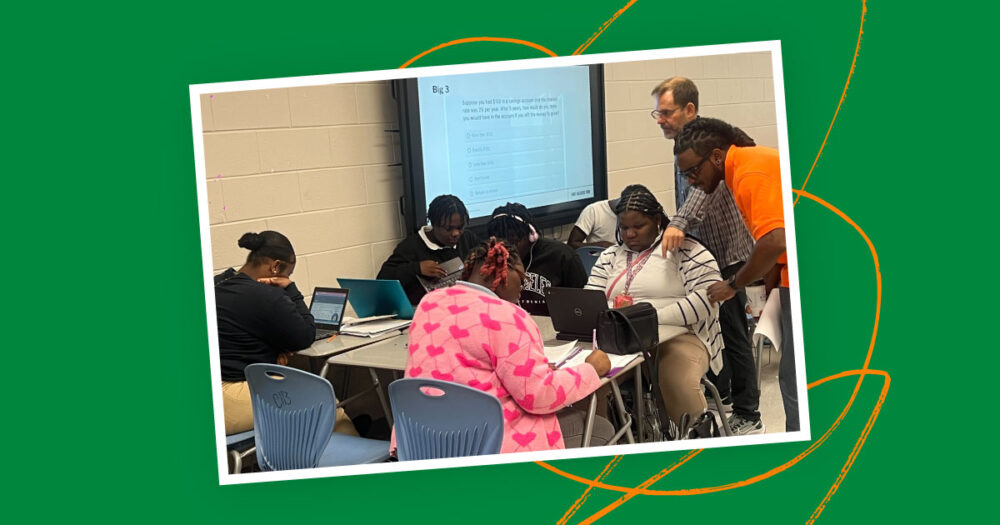
In communities like Selma—rich in history but long denied investment—building wealth requires more than financial advice. It requires repairing systems, rebuilding trust, and opening doors that have been closed for generations.
At Foot Soldiers Park, our wealth-building work starts with two of our newest programs LIFT UP and BUILD UP. These programs are designed to address the realities Selma faces today:
- Nearly 10% of Black households in Alabama are unbanked—five times the rate of white households
- Median household income for Black families in Selma is ~$27,000, less than half the state median
- Out of 498 businesses in Dallas County, only 15% are minority-owned despite being 81.2% Black
- 30% of Selma’s residents experience food insecurity on a daily basis
- 41% of residents live below the poverty line
- The homeownership rate in Selma is 46%, compared to 65% nationally
Generations of redlining, lack of access to credit, predatory loans, and persistent disinvestment have shaped today’s economic landscape.
But Selma also has something powerful: resilience, talent, and a deep history of community-led change. Based on research and intentional community engagement efforts, we have developed a list of effective strategies for building wealth in a community like Selma.
Foot Soldier’s Park strategies for building wealth in historically underserved communities
Start with Trust, Not Transactions
In communities shaped by institutional neglect, trust is the gateway to economic mobility. Wealth-building starts with deep, trusting relationships, culturally grounded education, and mentorship designed to walk with people—not ahead of them.
Provide Access to Financial Literacy
In places where many families are unbanked or underbanked, developing practical, local and culturally relevant tools for financial literacy needs to be done with these key areas in mind:
- How the wealth gap was created
- How to avoid predatory lending
- How to budget on fluctuating income
- How to start building credit early
Breaking cycles of multigenerational poverty is not an easy task and requires a holistic approach. Our BUILD UP program, which piloted this fall, brings this directly into K–12 classrooms to break cycles before they begin.
Create Clear, Supportive Pathways to Banking Access
Opening a checking account shouldn’t require a car, perfect credit, or money for minimum balances. Partnerships with mission-driven banks and credit unions are key to safe, accessible wealth-building and participation in the local economy.
Make Entrepreneurship Possible—not Just Aspirational
Selma has creativity and hustle. What’s missing is capital, coaching, and connections. Wealth-building requires:
- Small business training
- Help filing EINs and forming LLCs
- Access to microgrants or startup funds
- Mentorship from trusted professionals
This is at the core of our LIFT UP program.
Align Workforce Training with Real Local Job Opportunities
We can’t close the wealth gap without closing the skills gap. Economic mobility grows when training programs actually match the jobs available—and when people receive hands-on support navigating them. Our online Resource Center connects residents with services, opportunities and access to tools.
Strengthen Families, Not Just Individuals
Household-level stability impacts every aspect of life. We focus on addressing:
- Eviction prevention
- Renters-rights education
- Help accessing benefits
- Guidance for family financial planning
- Generational wealth depends on generational stability, knowledge transfer and access to resources.
Meet People Where They Are—Literally
From community centers to churches, schools, barber shops and after-school programs, we center the needs of the community as part of every solution, intentionally work to increase participation and reduce stigmas.
Invest in Youth Early and Consistently
Financial literacy works best when it starts early and not as a single high school class.Our new BUILD UP program gives students contextual understanding, practical tools, hands-on learning like investing simulations, and a culturally relevant approach to delivering information that is age appropriate for elementary, middle and high school students.
Our belief is rooted in the power of knowledge and self actualization: When people are met where they are, given the stage to share their needs and surrounded by support systems that celebrate their potential s, they can transform their lives and financial futures across generations.
Selma has always led change. Wealth-building is the next frontier.
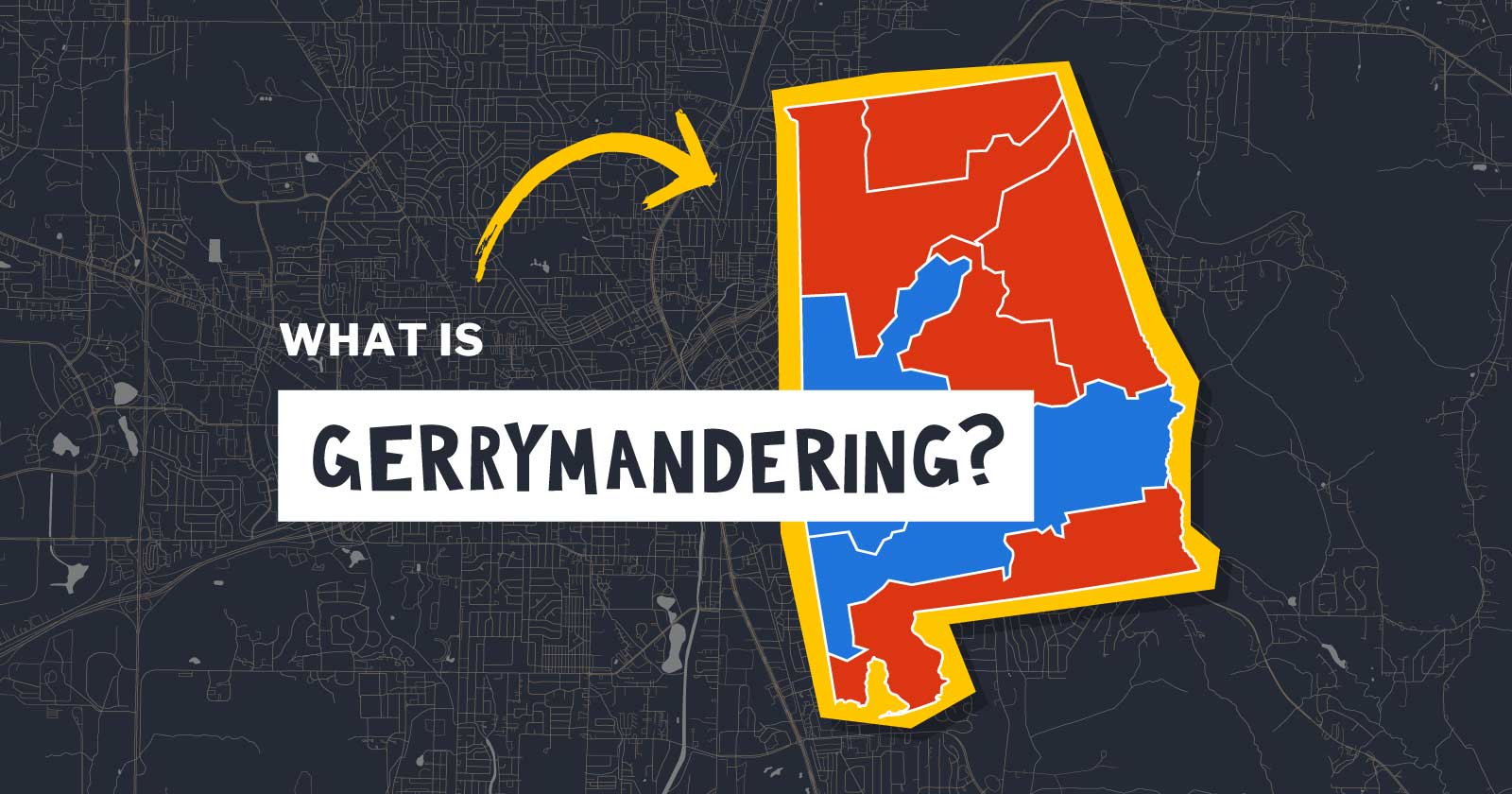
Political and racial gerrymandering are hot topics in the news today, and vitally important for anyone who cares about the power of their vote to understand.
Gerrymandering is when electoral district boundaries are drawn to favor one political party over another.
You’ve probably heard about the redistricting battle between Texas and California – which involves both political and racial gerrymandering. During its 2025 legislative session, the Texas legislature decided to redraw its congressional maps to explicitly favor Republican seats — an effort to maintain control of Congress in the 2026 midterm elections. The new maps are projected to give the party five additional seats in the House of Representatives — a clear act of political or partisan gerrymandering. In doing so, the Texas legislature shifted the boundaries of electoral districts to favor the GOP and weakened the voting power of Black and Latino Texans — also known as racial gerrymandering, the deliberate drawing of electoral district boundaries to unfairly and intentionally weaken the voting power of people based on their race.
In response, the California legislature countered that action by passing a ballot measure to adopt a new congressional map that favors Democrats. The measure offsets the additional GOP seats gained in Texas by creating additional Democratic seats in the House of Representatives. Many other states on both sides are pursuing similar actions in an unprecedented challenge to the very pillars of our democracy.
One of the key outcomes of gerrymandering is that it distorts the fair representation of voters in a state by limiting their influence in state legislatures or Congress. As the battle around gerrymandering heats up, many are raising questions about the future of voting rights and fair representation in this country.
The practice has long undermined fair representation in our home state of Alabama, especially for Black communities – particularly given that we make up almost a third of the population.
For instance in 2021, the state legislature drew maps that “packed” unnecessarily large numbers of Black voters into one state senate district in the Montgomery area. While this allowed Black voters to decisively elect their preferred candidate in that district, it reduced their presence in neighboring districts and therefore, weakened their ability to elect representatives who would reflect their interests.
Alabama lawmakers also “cracked” or split significant numbers of Black communities in the Huntsville area across multiple districts, spreading Black voters thinly across state senate districts, diluting their voting power again.
Black voters make up almost a third of Alabama’s population, and should have the chance to affect the outcome of state senate races. But because of the partisan gerrymandering, they only had the opportunity to elect one senator out of 35.
It’s important to note that gerrymandering impacts more than just politics. It directly affects economics. When communities lose fair representation, they lose voices in government to fight for their needs. In Alabama, this has allowed gerrymandering to widen racial inequities generation after generation. Black communities in the state have had less access to resources, economic investment and public services such as schools, hospitals, transit or housing.
Selma is a painful example. The majority-Black city frequently receives less state support for economic development, poverty relief, and community health than their needs demand. This compounds Selma’s political, economic, and social struggles — preventing sustainable progress, perpetuating harmful practices and reinforcing neglect.
In 2023, the Supreme Court ruled against the Alabama legislature in Allen v. Milligan, saying its 2021 map violated the Voting Rights Act of 1965 and ordered lawmakers to draw new maps with at least two districts where Black voters had a fair chance to elect their candidate of choice. But – that decision and the resulting redrawn maps in our state are now in jeopardy with the Supreme Court’s recent hearing of the Louisiana case Callais v. Landry. In this case, the Louisiana state legislature drew a new congressional map in 2024 to comply with a court order that found that the previous map weakened Black voters’ influence under the Voting Rights Act. White voters sued the state soon thereafter, arguing that the state committed racial gerrymandering when it created the new map. The Court is expected to rule in the case by June 2026.
In 1965, foot soldiers in Selma, like our founder Ms. Jo Ann Bland, risked their lives for Black people to have a voice in what happens in their communities and to be fairly represented at all levels of government — after nearly a century of having no voice or representation.
At Foot Soldiers Park, we believe that protecting that legacy is central to ensuring every generation knows its power in shaping democracy – by fighting for the right to vote, demanding fair representation, and building communities where every voice truly counts.
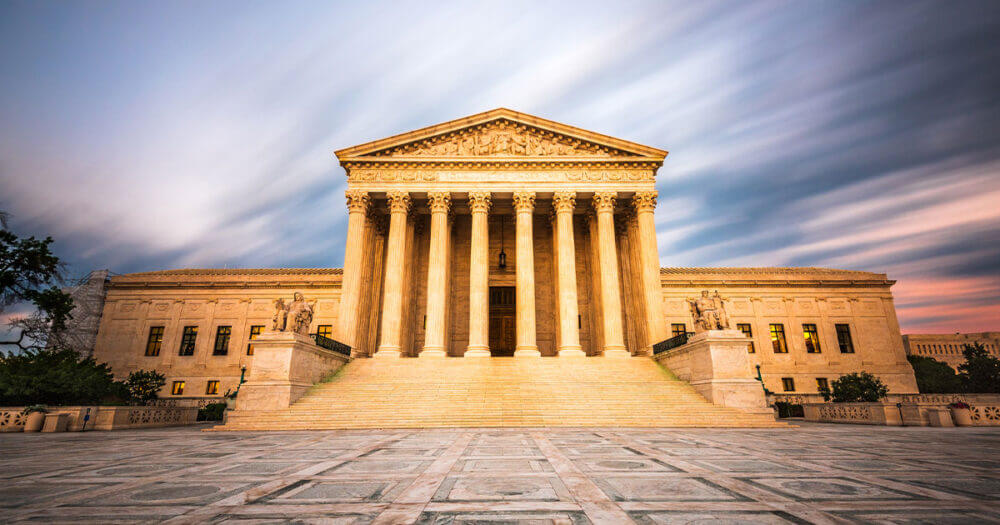
The Voting Rights Act (VRA) of 1965 has protected communities of color for 60 years from discriminatory voting laws and legislatures from drawing congressional maps that dilute their vote. But this week, the US Supreme Court heard oral argument in a case that could strip the last remaining piece of the landmark civil rights law — ultimately making it powerless.
Where it All Started
The case, Callais v. Landry originated in Louisiana with a dispute over a new majority-Black voting district, which was created under federal court order to comply with the VRA. The Louisiana legislature had made redistricting changes, after the 2020 Census, drawing a new map with only one district out of six districts representing Black voters’ interests, despite the Black population being one-third of the state.
Black voters and civil rights groups sued the legislature, arguing that Black Louisianans face continued patterns of discrimination in voting and civic life, and the map exacerbated that treatment, unfairly diluting their representation in the state. In 2022, a federal court ruled in their favor, ordering a second majority-Black district.
In 2024, the legislature redrew the state’s voting districts including a second Black district. But white voters then filed suit, arguing that the new map violated their rights under the Constitution and race should not be a factor in creating electoral maps.
What’s at Stake in the Case
Section 2 of the VRA prohibits states from passing voting laws or drawing electoral maps that make it harder for Black or other voters of color to participate or elect their candidate of choice. The law also says that it doesn’t matter if the discrimination is accidental. If a law or map results in voters of color having less power, then it is illegal.
According to news reports, the Supreme Court justices appeared poised to weaken Section 2 of the VRA by limiting lawmakers from using race as a factor in drawing voting maps. If this happens, it will fundamentally change the landscape of voting rights and redistricting in the US with the future of the voting power of people of color hanging in the balance.
A ruling against the Black voters in the Callais case could:
- Strip communities of color of their political power and fair representation at all levels of government, particularly in the South. For example, according to The New York Times, a dozen Democratic-held House districts across the South could be eliminated.
- Chill legislatures nationwide from drawing majority-minority districts
- Make it nearly impossible for voters to challenge discriminatory maps or voting practices
- Open the floodgates to a new era of discriminatory laws that suppress votes—not only of Black Americans, but of any community perceived as a threat to those in power.
Calling on Alabama to Step Up
Foot Soldiers Park is watching the case closely and calls on Alabama to pass its own Voting Rights Act SB7/HB60 to provide robust protections against racial discrimination in voting.
Key parts of the Alabama legislation include:
- Expanding voter access by allowing same-day voter registration, eliminate the need for specific reasons to vote absentee, and streamline the process for restoring voting rights for residents who were formerly incarcerated
- Creating new oversight and protections by requiring local governments with a history of discrimination to prove their voting laws don’t harm voters of color. The law would also establish a commission to investigate potential violations, and outlaw policies that result in disparities in electoral participation.
- Enhancing transparency and data collection by directing the Alabama Secretary of State to create a public statewide database of election and demographic information to foster transparency and evidence-based election administration.
A decision in the Callais case is expected in the coming months.
At Foot Soldiers Park – an organization based in Selma, the birthplace of the VRA and founded by Jo Ann Bland, a foot soldier who walked across the Edmund Pettus Bridge on Bloody Sunday – we are calling on Alabama lawmakers to act now and pass Alabama’s Voting Rights Act to protect the voting power of every Alabaman, regardless of race.
Because protecting voting rights isn’t just about keeping laws in place – it’s about preserving Selma’s legacy and protecting democracy itself.

Foot Soldiers Park has awarded its inaugural Jo Ann Bland Civil Rights Legacy Scholarships to two Selma-area students: Jo’Darius (JD) Hamilton and Rachel Curtis. This scholarship specifically honors students who are descendants of foot soldiers and who demonstrate civic commitment, academic excellence, and leadership aligned with the organization’s mission.
The awards were presented during a ceremony at the Foot Soldiers Park administrative suites on July 16. Founding partners CEO Kimberly Smitherman and civil rights icon Jo Ann Bland presented the scholarships in front of an audience of family members, staff, and community supporters.
Jo’Darius (JD) Hamilton
JD Hamilton, a graduate of Southside High School, will be attending Auburn University in the fall, in the Building Science program, entering the professional track in Construction Management. JD is the grandson of foot soldier Albert Southall Sr., the founder of Southall’s African American Literary and Arts Museum and Gallery inSelma. JD graduated with a 3.52 GPA, with courses in economics, government, writing, and STEM. He is also active in civic and community initiatives that build on his family’s legacy.
“It made me feel truly special to be one of the first two recipients. I’m grateful to the foot soldiers, and I just want to say thank you. What they did was so honorable, and I just feel very special,” JD told Foot Soldiers Park staff.
Rachel Curtis
Rachel Curtis graduated from Selma High School and will be attending Tuskegee University in the fall. Rachel is the granddaughter and great-granddaughter of foot soldiers, all of whom participated in 1965 civil rights marches. Her grandmother Rachel West Milhouse was the co-author of Selma, Lord, Selma, a first-hand account of civil rights marches of 1965. Her great-grandfather was Lonzy West, Sr. and her great-grandmother was the late Alice Martin West, a well-known Selma activist who helped more than 300 Black people register to vote by preparing them to pass the literacy test requirement at the time. Rachel completed a dual enrollment program with Wallace Community College and graduated with over 30 earned credits and a cumulative GPA of 3.21. Her studies included business finance, health sciences, and economics.
“I am appreciative and want to thank the foot soldiers. They’ve taught me that hard work and dedication pay off in the long run. Knowing that more scholars will be blessed with this scholarship after me makes me happy and it inspires me,” said Rachel.
Each recipient received a $2,000 scholarship and a commemorative photo with Ms. Bland. The award serves as a symbolic bridge between generations, honoring the legacy of civil rights activism while supporting the educational futures of today’s youth.
“These kids are so deserving. They’re the ones who are going to make a difference. I want them to remember the legacy of the people they represent, whose blood runs through their veins, the foot soldiers. They are the foot soldiers of today, and I’m incredibly proud and honored that they are our first recipients,” said Ms. Bland.
About the Scholarship
The Jo Ann Bland Civil Rights Legacy Scholarship is awarded to descendants of foot soldiers from Selma’s civil rights movement. The scholarship supports youth who embody the courage, vision, and civic spirit of the movement’s pioneers. Recipients are selected through an open application and review process.
This year marks the first iteration of what will become an annual scholarship opportunity. Foot Soldiers Park plans to expand the fund and support more students in Dallas County and beyond in the years to come.
“I’m super excited that we were able to give two scholarships to two very deserving residents and students here in Selma. I think that this is a step forward for our community in supporting our youth because we know the youth are our future. And this is just the beginning. We will continue to grow the amount of scholarships we give and the amount of funding that we give and we hope that we can get support from the community, from people all around the world so that we can do that for our youth.” – Kimberly Smitherman
Follow @footsoldierspark on Facebook and Instagram for photos and event updates.

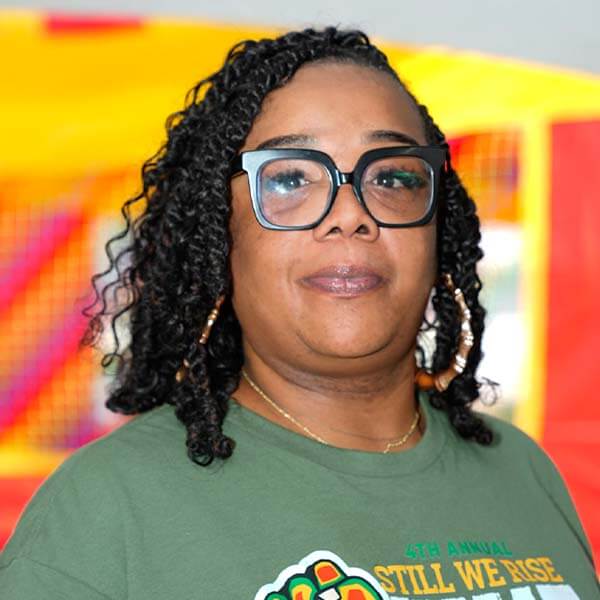
“At Foot Soldiers Park, Juneteenth is not just symbolic, it’s strategic. It’s where truth and joy and memory and activation all come together. And we use that power of the holiday so we can meet people where they are.”
– Kimberly Smitherman, CEO and Founding Partner
At Foot Soldiers Park, we intentionally celebrate pivotal moments in civil rights history not only to honor the individuals and communities who were instrumental in societal progress and to ensure that their struggles are not forgotten, but to foster awareness of the challenges that those of our past have overcome and the lessons learned — because we know that awareness can inform and inspire present and future decisions.
This year’s Still We Rise Juneteenth celebration was no different. We commemorated June 19, 1865 when enslaved Black Americans in Texas finally learned that the Emancipation Proclamation officially ended slavery two years earlier.
The community joined us for a lively celebration chock full of live entertainment, dancing, carnival rides, face painting, good food, and an opportunity to support local businesses.
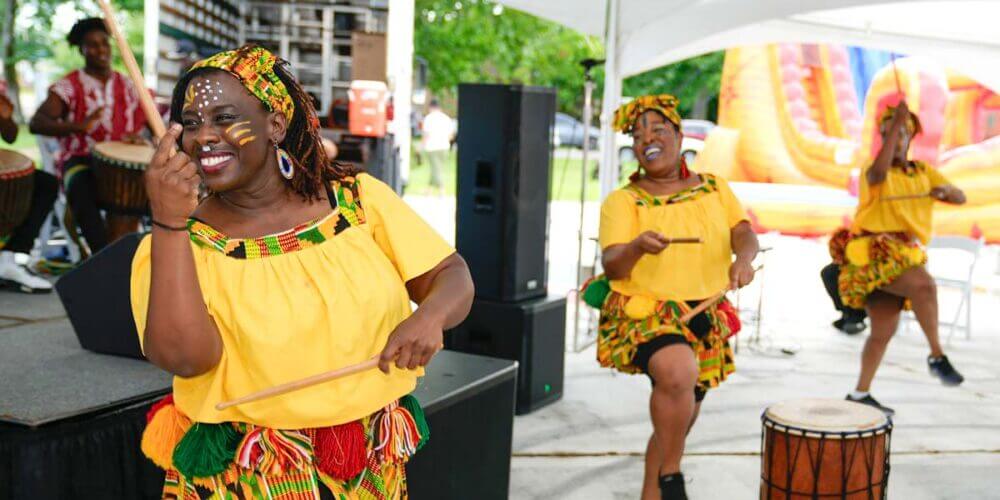
As part of our commitment to honoring Selma’s civil rights past, we recognized 1965 foot soldier Ms. Barbara Barge who continues to share her powerful story and work to preserve the legacy of Selma’s historic role in the racial justice movement by serving as one of Foot Soldiers Park’s tour guides.
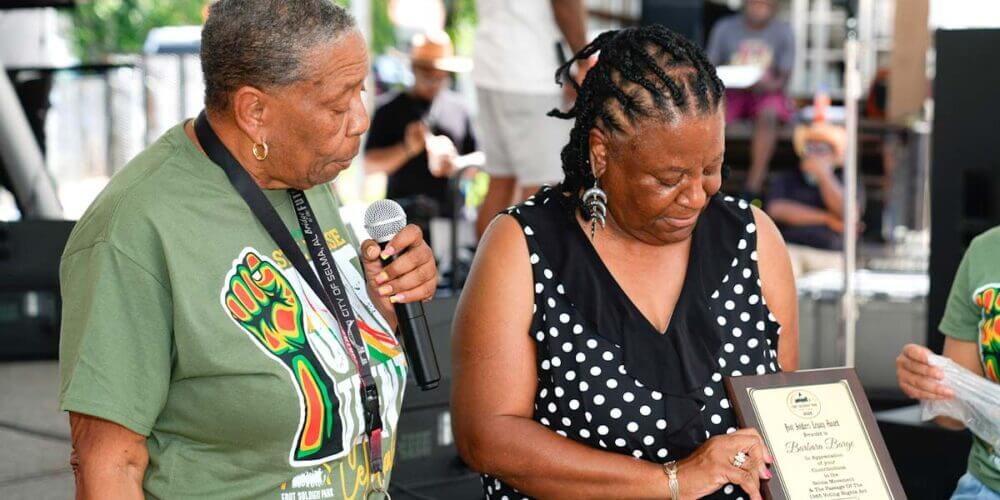
Most importantly, the event served as a reminder of Selma’s long commitment to freedom and why today more than ever, we need to build on the resilience of those who came before us, cross bridges we haven’t crossed before, and do our best as civically active people to fuel lasting and positive change.
Just as enslaved Black people in Galveston, Texas, experienced delayed freedom in 1865, Selma’s Black residents today continue to face similar injustice. This ongoing struggle is evident in systemic inequality, persistent barriers to voting access, and profound community disinvestment.
“We want to make sure that we preserve our history, but also, to make sure that we utilize that history to activate our community and especially our youth,” Founding Partner and CEO, Kimberly Smitherman told attendees.
As part of the day’s events, Kim spoke to actor, comedian and radio host John Fugelsang on his SiriusXM show “Tell Me Everything”. She shared the key components of community activation and how tapping into the knowledge and expertise of the people who are most negatively affected by the harmful systems is just the first step, equipping them with the knowledge, skills and tools to change them is what drives real transformation.
“We don’t come in as saviors,” Kim told the host. “We [want] to make sure that we have an informed and engaged civic community so that they can know that their voices have power. They have the power to make change.”
Foot Soldiers Park impact and programmatic areas are focused on educating, employing, and empowering Selma’s residents and next generation of foot soldiers through civic education, youth leadership programs, art, economic development initiatives and strategic partnerships to build a vibrant, thriving and self-sustaining community.
“We refer to [the foot soldiers] as the ordinary people who did extraordinary things… and we want everybody to have that same sense of ability in their [own] voice [today],” said Kim.
You can listen to more of Kim’s interview on “Tell Me Everything” where she also talks about what other communities similar to Selma can learn from Foot Soldiers Park and how her personal background shaped her view of racial justice and the work ahead.
In addition, Kim Juneteenth’s opinion piece was featured on the news outlet Common Dreams where she emphasized further the significance of Juneteenth and why Foot Soldiers Park’s mission is so relevant today.
Looking ahead, as we celebrate our heroes of the past, we must also not forget that our democracy remains fragile, our liberties are under threat again, and as a resilient community, we need bold leaders to show the way.
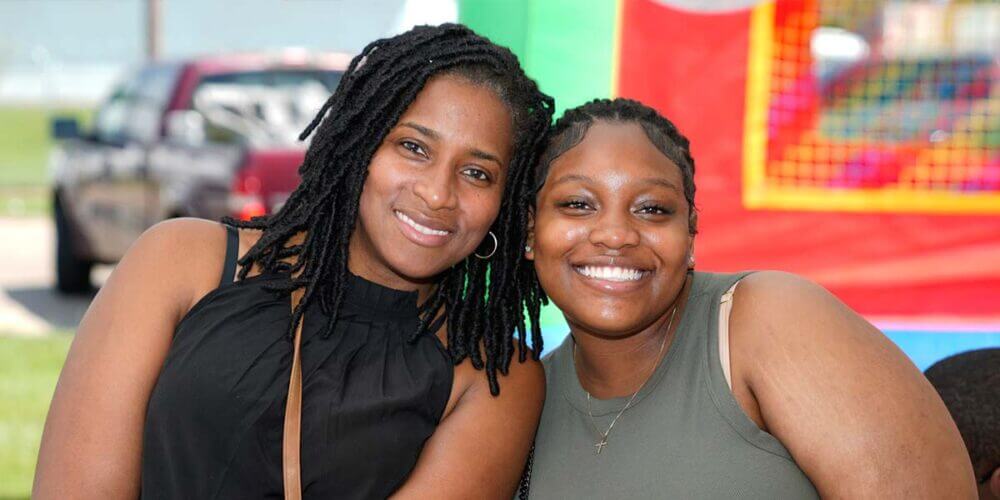
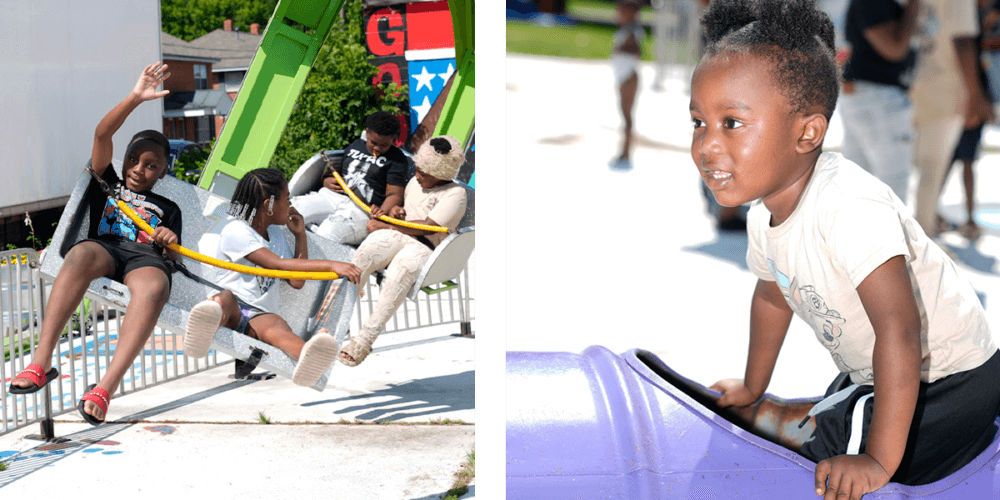
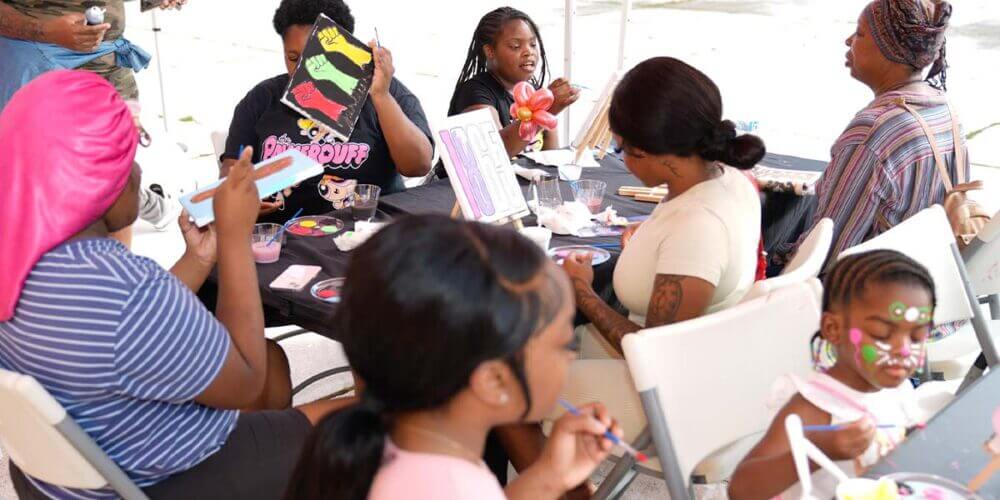
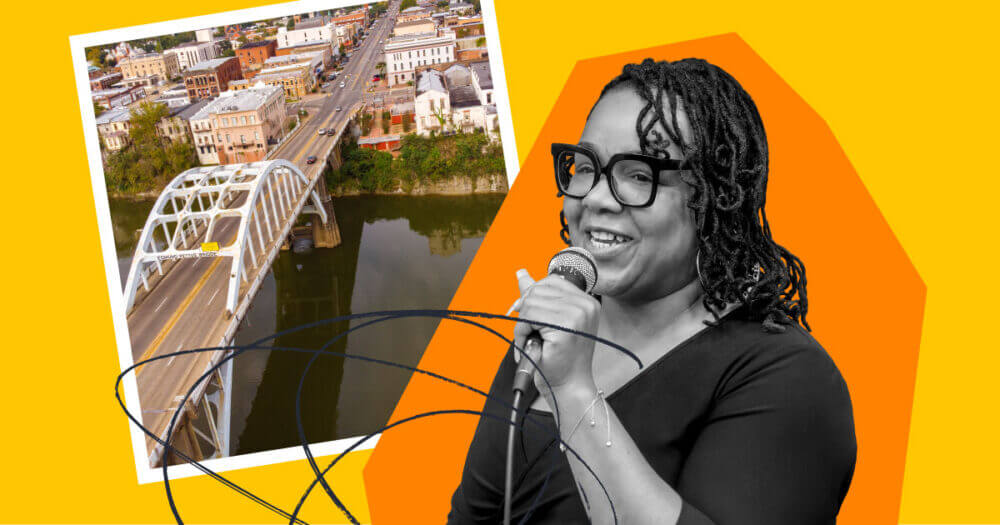
This opinion piece, written by Foot Soldiers Park leaders Ms. Jo Ann Bland and Kimberly Smitherman, was published on the news outlet Common Dreams on June 19, 2025.
At Foot Soldiers Park, Juneteenth is more than a date on the calendar. It’s a declaration, a call to always remember, to resist, and to continue to reimagine what freedom looks like.
For the last four years Juneteenth has become a commemoration of historic significance that has become more powerful and more necessary. As a community, we gather not just to honor history, we gather to face the present and to envision a better future rooted in truth, justice, and collective power.
Juneteenth commemorates June 19, 1865, the day the last enslaved people in Galveston, Texas were finally told they were free—more than two years after the Emancipation Proclamation. That delay wasn’t a historical oversight, it was an intentional strategy of suppression that today, still shows up through the systems we confront daily.
Today one thing is clear, slavery didn’t end, it evolved. It’s been institutionalized in the form of mass incarceration, labor exploitation, generational poverty, voter suppression, and policies that consistently and disproportionately harm Black and Brown communities. 160 years later, Black and Brown people are still profiled, surveilled, underpaid, and denied full access to justice.
And yet, we are still here. Still resisting. Still building our communities up. Still rising.
Our hometown Selma is ground zero for the struggle for voting rights and the fight for the socioeconomic prosperity of people of color in our country. We both span two generations of Black people in Selma. One of us was among the 600 foot soldiers who bravely marched across the Edmund Pettus Bridge and demanded voting rights for Black people – ultimately leading to the passage of the Voting Rights Act in 1965. The other one of us was raised to carry that spirit of activism and determination to protect and preserve those rights for generations to come.
In 2021, at a historic moment for our country, we founded Foot Soldiers Park to preserve Selma’s legacy, memorialize the stories of the everyday people who fueled the Civil Rights Movement, and to position the city’s historical significance into an engine for liberation, economic development, and racial justice.
With a mission rooted in the legacy of Selma’s foot soldiers, we don’t shy away from the truth, we walk directly into it. Because that’s where change is born and transformation begins. We don’t just preserve history, we activate it. We innovate. We organize. We lead.
Juneteenth is a reminder of why the march for liberty and justice is not over, but a moment to recommit to the work ahead.
Despite Selma’s historical significance in shaping the very fabric of this country, the majority-Black city is still struggling to overcome generations of institutional racism and overall neglect. Forty-one percent of the population lives in poverty. Thirty-percent are suffering from food insecurity, and an abysmal $27,000 a year is the average income in the city.
When we founded Foot Soldiers Park, we had a clear goal – to transform Selma, ask hard questions and set a bold agenda to build generational wealth, protect our civil rights, and empower our youth to lead. We are campaigning to fund Selma’s first-ever community and education center, and foot soldiers memorial. This urgently needed hub will be a beacon for leaders, students, and educators to weave the rich tapestry of Selma’s Civil Rights Movement and serve as a conduit for ongoing scholarship in this critical field. As our civil rights are again under attack, we’ll serve as a catalyst for community-led action and civic participation, healing and restoration, youth engagement and activation – building the bench for the next generation of political, business and social justice leaders.
This Juneteenth we need to face the truth – there will be no erasure. What our history shows is how resilience can lead to transformation. Generation after generation we have turned pain into purpose, and memory into motivation to design systems that move us closer to justice.
As Dr. Martin Luther King Jr. said, “A right delayed is a right denied.” Juneteenth reminds us that justice delayed is not justice at all. Freedom withheld is not freedom for all. And the arc of the moral universe does not bend unless we bend it. Together.
For us Juneteenth is not just symbolic. It is sacred. It is strategic. It is where truth, joy, memory and action converge.
Every year we celebrate because our people’s story does not end in chains. We celebrate because our ancestors did more than survive; they organized, educated, resisted, and loved. We celebrate because freedom was never handed to us, we claimed it in 1865, in 1965 and we must claim it today.
In Selma, we never rest and we don’t sugarcoat the truth. We are the foot soldiers of 1965 and the foot soldiers of tomorrow – as agents of change, we will keep marching forward.
Jo Ann Bland and Kimberly Smitherman, both Selma natives, are the founding partners of Foot Soldiers Park. Ms. Bland was one of the youngest foot soldiers who walked across the Edmund Pettus Bridge in 1965 on Bloody Sunday. Ms. Smitherman is a next generation civil rights activist.
On March 22, 2025, Foot Soldiers Park’s very own Kimberly Smitherman was presented with the Perpetuating Empowerment Ignited By Mentors Leadership II award from the Selma Alumnae Chapter of Delta Sigma Theta Sorority for her over 10 years of community involvement and activism and for her unwavering dedication to the city and people of Selma.
This distinguished award aims to identify and celebrate people who consistently demonstrate leadership qualities, such as initiative, organization, and the ability to inspire others – all characteristics that Kim has exemplified and continues to demonstrate throughout her career and role as an effective and inspiring leader.
The award is named in honor of two extraordinary women foot soldiers, Margaret Jones Moore and Amelia Boynton Robinson. Ms. Moore was a courageous educator and civil rights activist in Selma during the 1965 voting rights movement. As a teacher, she organized almost every Black teacher in the city to march to the courthouse demanding the right to vote. It was a key turning point in the protests leading up to Bloody Sunday.
Ms. Boynton Robinson is best known for her role as a prominent civil rights activist who was instrumental in building the voting rights movement in Selma. She made her home a center for strategy sessions for Selma’s civil rights battles, and was among the seventeen people beaten and left unconscious during the Bloody Sunday march. She was also the first Black woman to run for Congress from Alabama.
“I am deeply honored to receive the Leadership II Award from the Selma Alumnae Chapter of Delta Sigma Theta Sorority, Inc., in the names of two extraordinary women, Margaret Jones Moore and Amelia Boynton Robinson,” said Kim. “Their legacies of fearless activism and unwavering commitment to justice are the foundation upon which we build today. At Foot Soldiers Park, we carry their torch forward, igniting, empowering, and perpetuating the movement for equity, truth, and transformation. This recognition is not mine alone. It belongs to the people of Selma and every hand helping to shape a brighter future.”
Congratulations, Kim! Well deserved!

